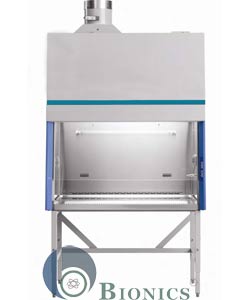Class 2 Biosafety Cabinets – Vital for Lab Safety and Biological Containment

In today’s scientific and clinical labs, safety for personnel and samples is non-negotiable. Whether it's conducting biological tests, diagnostics, or experiments with infectious agents, biosafety cabinets form the backbone of contamination control.
Of all types, Class 2 cabinets are most commonly used due to their efficiency and versatility. These units are crucial for working with moderate-risk organisms and sensitive samples.
Overview of Biosafety Cabinets in Laboratory Environments
Biosafety cabinets are specially designed, enclosed systems that ventilate and filter lab air. They use high-efficiency filters to purify air entering and leaving the cabinet.
These units are generally classified into Classes I, II, and III depending on airflow and application needs. Among these, Class 2 cabinets are the most versatile and commonly used.
What Are Class 2 Biosafety Cabinets?
Class 2 Biosafety Cabinets are designed to safeguard three aspects: the operator, the sample, and the environment. They utilise downward laminar airflow within a sealed system.
Contaminated air is drawn into the cabinet and filtered through HEPA systems before recirculation or exhaust. These cabinets are frequently used in labs handling infectious agents or clinical samples.
Essential Features of Class 2 Safety Cabinets
A Class 2 microbiological safety cabinet includes several advanced features such as:
• Medical-grade filters for capturing contaminants
• Uniform downward airflow to protect the sample zone
• Negative pressure barriers to prevent leakage
• Germicidal UV lamps to disinfect the work area
• Low sound emissions to reduce fatigue
• Clear front panel for visibility and safety
These elements support lab workers in maintaining sterile working environments.
Applications in Research and Healthcare
Class 2 Biosafety Cabinets are widely deployed in clinical labs, vaccine R&D, and academic research. They are ideal for safe handling of samples during testing and experimentation.
From universities to private pathology labs, Class 2 cabinets ensure lab hygiene and sample integrity.
Advantages of Installing Class 2 Cabinets in Your Lab
Using Class 2 cabinets offers significant improvements in contamination control and user safety:
• Protects the integrity of lab Biosafety Cabinets work
• Prevents accidental exposure to infectious materials
• Minimises lab contamination and pollution risks
These cabinets support biosafety goals while improving lab productivity.
Cabinet Types and Global Compliance
Top manufacturers ensure their cabinets meet certifications like NSF 49, EN 12469, and WHO recommendations. Class 2 units are sub-classified as A1, A2, B1, and B2—each with distinct airflow and exhaust features.
• Type A2: Ideal for general-purpose labs
• Type B2: Exhausts 100% of air via ducting; no recirculation
Selecting the right configuration ensures compliance and safety.
Tips for Purchasing the Ideal Biosafety Cabinet
Before purchasing, consider:
• The biosafety level required (BSL-1, BSL-2, or BSL-3)
• Cabinet dimensions, ducting needs, and room layout
• Energy consumption and maintenance frequency
• Service network and part availability
Working with reliable manufacturers provides peace of mind and technical guidance.
Safe Setup and Operation of Class 2 Cabinets
For optimal results:
• Install the cabinet in a draft-free, low-traffic zone
• Schedule regular performance checks
• Educate staff on cabinet operations and safety
Operational best practices include:
• Maintain biosafety gear protocols
• Work calmly to prevent airflow disturbances
• Decontaminate surfaces before and after use
• Treat UV usage as an overnight sterilisation method
Conclusion
Class 2 biosafety cabinets are essential for labs that value safety, precision, and cleanliness. They protect workers, secure samples, and copyright environmental standards.
From pathology labs to advanced genetic testing, Class II cabinets support world-class laboratory practices. When investing in a biosafety cabinet, choose performance and reliability over cost-cutting—because lab safety is non-negotiable.